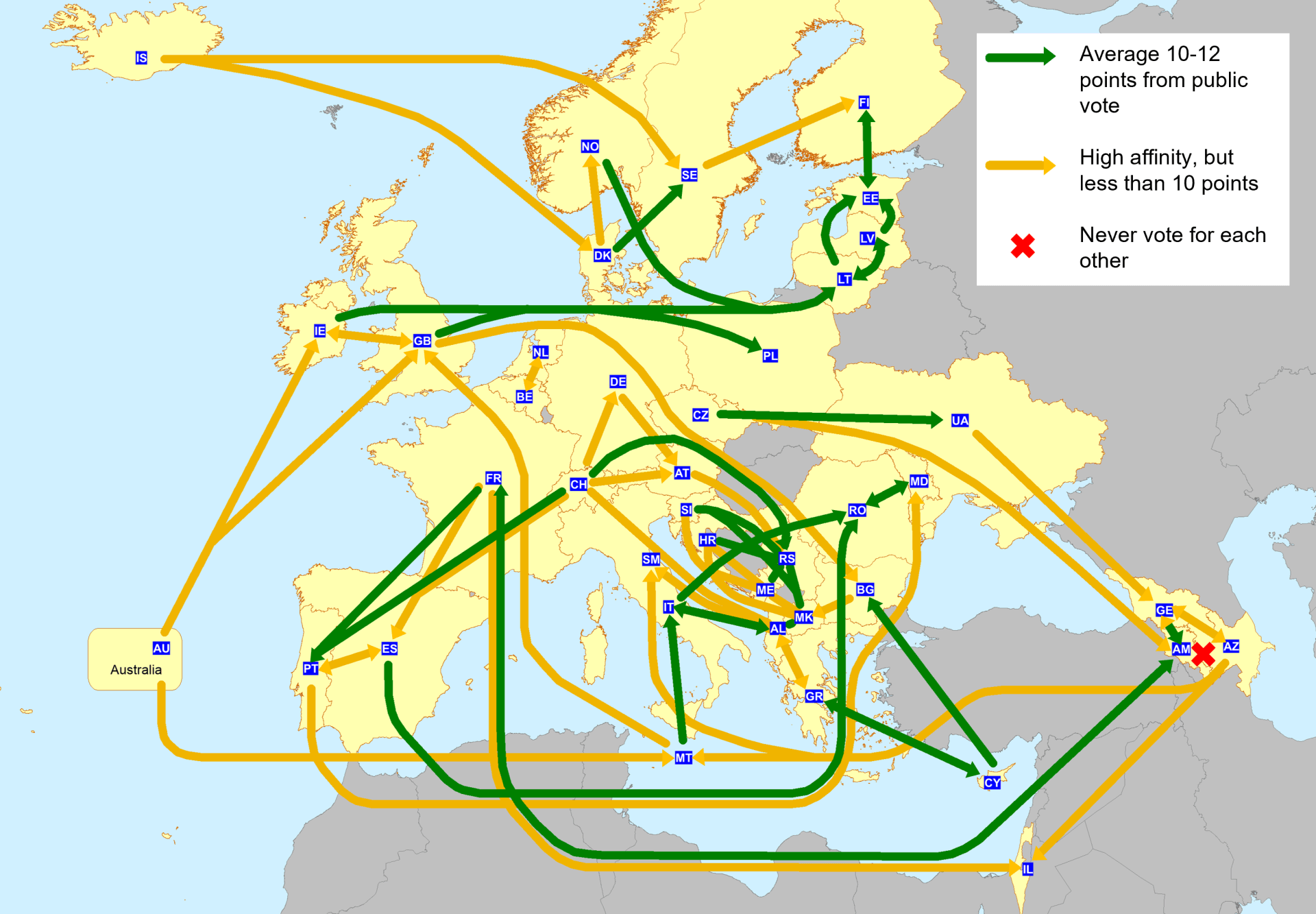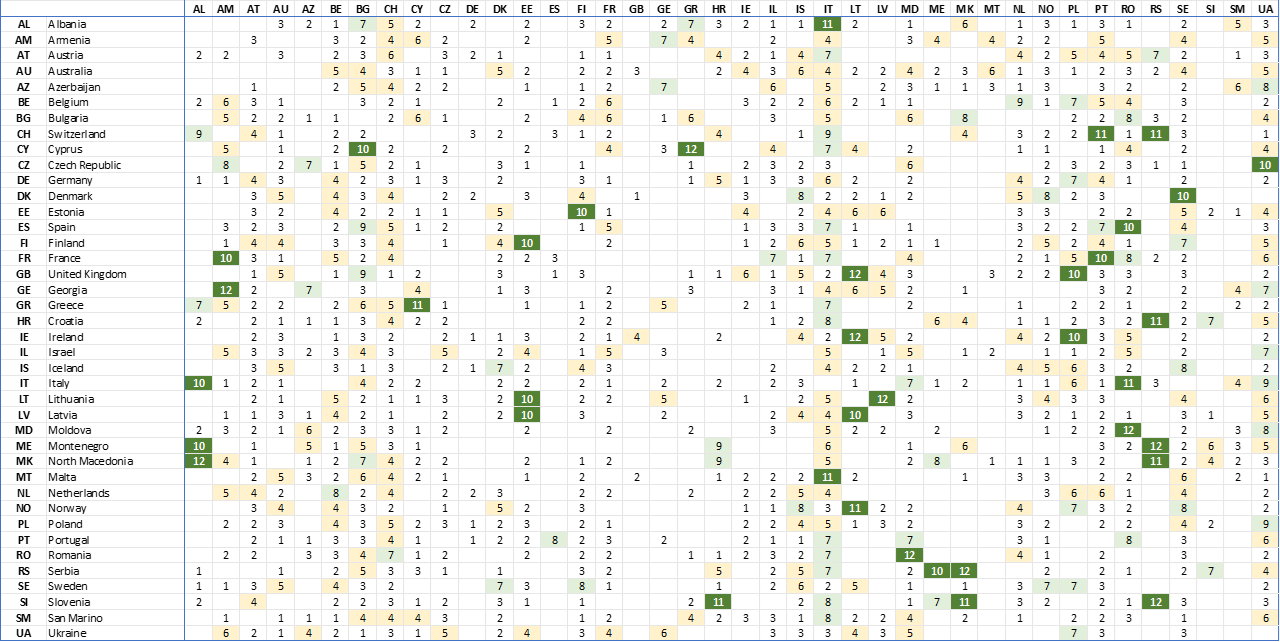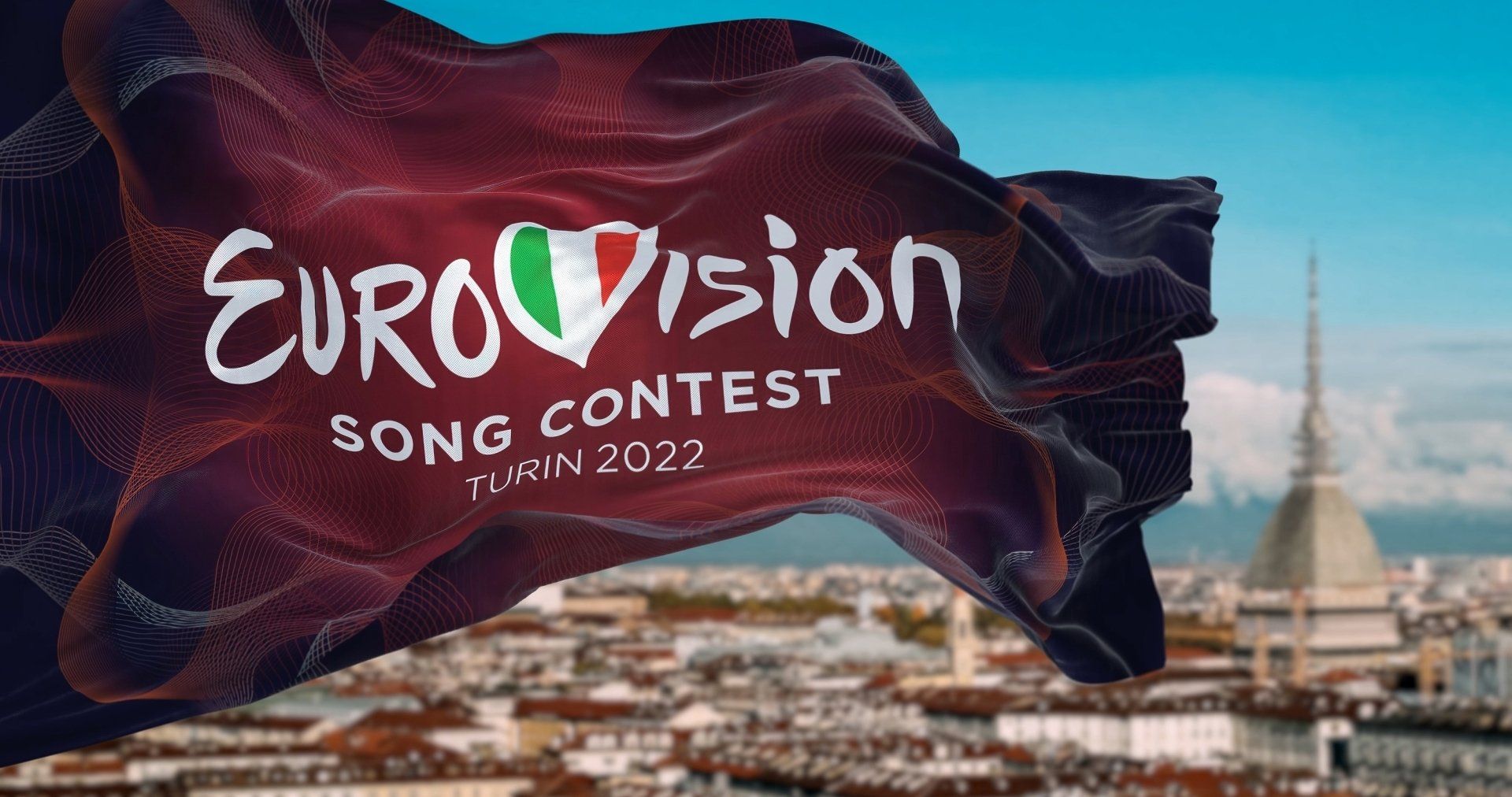Analysing Eurovision 2022, and What’s the Secret of Meghan Markle’s Healthy Hair?
12th May 2022
So, what’s the secret of Meghan Markle’s healthy hair? Deep hydration is the answer, if the singer of Serbia’s entry in this year’s Eurovision Song Contest is to be believed. And perhaps namechecking someone so famous in a song, mainly sung in Serbian, will give them the je ne sais quoi they need to attract points. It’s actually a good song, and even though it doesn’t have the traditional Balkan vibe, it should get points from its neighbours.
For the past few years now, the organisers of the Eurovision Song Contest have released all the voting data from both the public votes and the juries, and sometimes, but not always, it does confirm that neighbouring countries do vote for each other. Historical, cultural and linguistic similarities obviously play their part in how much people enjoy a performance. In Figures 1 and 2 see our analysis of the rankings each country has given to another over the years compared to the average.

Figure 1: Map of Average Scores From the Public Vote 2014 – 2021

Figure 2: Table of Average Scores From the Public Vote 2014 – 2021
From our analysis, certain combinations really stand out! Read on for some more in-depth analysis and predications what is in store this weekend for Eurovision 2022.
Viewers of a certain age in the UK will recall Terry Wogan would always predict 12 points from Greece to Cyprus and vice-versa, way before the announcers would do so. Thankfully that’s one tradition that hasn’t changed in the slightest. In the Balkans, the former Yugoslav countries can all be counted on to vote for each other, with Albania and Bulgaria also featuring highly with the public vote from those countries furthest south. In an effort to reduce these effects as much as possible, neighbouring countries are now placed in separate semi-finals, meaning such tendencies don’t affect the qualification process at least.
Elsewhere, Belgium will vote for the Netherlands and the Netherlands will vote for Belgium. Both countries have upped their game in Eurovision terms in recent years, so this has really started to stand out. Similarly, the German speaking countries (Germany, Austria and Switzerland) tend to vote more highly for each other than most countries, but this doesn’t necessarily equate to maximum points being awarded – just that the affinity between these countries is higher than most.
The Nordic countries all vote highly for each other, particularly Denmark to Sweden (slightly less so in the other direction), Iceland to Denmark (slightly less so in the other direction) and Sweden to Norway (slightly less so in the other direction). The Baltic States do likewise amongst themselves, and Finland divides itself between both the Scandi and Baltic camps.
A few others of note to point out are between Romania and Moldova, including Italy and Portugal to a lesser extent in that mix. The more people move to live and work in other countries, the more the diaspora affects the scoring at Eurovision. The UK and Ireland will vote for Poland, but sometimes we may even give more points to Lithuania. The affinity is high between Albania and Italy, and between France and Armenia. Australia, Ireland and Malta score the UK much more highly than most countries, but given our recent contributions this still doesn’t actually translate into many points.
With Russia banned from entering this year, one of the most important blocs of voting affinity has been shattered. The states of the former Soviet Union would tend to vote highly for each other. Now this leaves Georgia, Armenia and Azerbaijan in the South Caucasus without Russia to vote for. Armenia and Azerbaijan will vote for Georgia, and Georgia will vote for Armenia and Azerbaijan. The war between Armenia and Azerbaijan guarantees that neither of these countries will vote for each other; indeed they are almost certain to rank each other last, both from the juries and the public vote.
However, this year the war in Ukraine must be on everyone’s minds when they watch Eurovision. The fact that Ukraine is even taking part should be something for the nation to be proud of. It’s likely that this in itself will garner enough support for a landslide from the public vote. The question is, will the national juries behave likewise? You may remember the Polish milkmaids from 2014 – the UK public gave them top marks but the UK jury ranked them 26th out of 26.
Ukraine often has a great song. They’ve won twice (Ruslana in 2004, Jamala in 2016) and have had some fabulous also-rans (Verka Serduchka in 2007, Svetlana Loboda in 2009 amongst others). But this year’s entry is a bit more mid-table than usual. If you’re honestly ranking songs from best to worst, this year’s entry for Ukraine wouldn’t be at the top of the list. In fact, it wasn’t even at the top of Ukraine’s list. In the Ukrainian selection show back in February, their entry came second (the act that came first ended up being disqualified).
Italy would win again this year if Russia hadn’t invaded Ukraine. The Italian entry is excellent and ticks all the right boxes. For four hours on 14 May we’ll hopefully be able to concentrate on the battle between Italy and Ukraine at Eurovision. In a modern Europe, this should really be as confrontational as it gets.
Ultimately, we can’t narrow it down to a two-horse race. There are 40 countries competing at this year’s Eurovision and some of them are really good. All sorts of national affinities ensure that certain countries receive more points than others. What’s really important to stand out above the rest is having a good song. The UK has repeatedly entered without taking that into account for several years now. This year it’s an exception, the UK is quite good, so let’s see how well we do. And if you think this year’s Ukrainian entry isn’t for you but you liked the more Kazantip vibe of last year’s entry, there’s bound to be more of that sort of brilliance in years to come. Have a few vodkas and turn the sound up on the Serbian entry and you’re almost there.
Get In Touch
What are your thoughts on our Eurovision analysis? Get in touch at info@gmap.com to have your say or to learn more about our day-to-day analytics capabilities. Enjoy Eurovision 2022!




